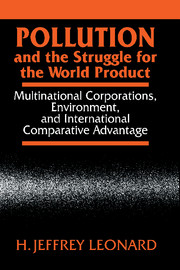 Pollution and the Struggle for the World Product
Pollution and the Struggle for the World Product Book contents
- Frontmatter
- Contents
- List of tables
- Preface
- Introduction
- 1 The dynamics of international trade and industrial location
- 2 Industrial-development strategy and the role of multinational corporations
- 3 Pollution and comparative advantage in industrial production
- 4 Environmental regulations and the industrial-flight hypothesis
- 5 Pollution and industrial strategy in four rapidly industrializing countries
- 6 Bargaining for the right to pollute
- 7 The politics of pollution and multinational corporations in rapidly industrializing countries
- 8 Theoretical implications and policy recommendations
- Index
3 - Pollution and comparative advantage in industrial production
Published online by Cambridge University Press: 05 January 2012
- Frontmatter
- Contents
- List of tables
- Preface
- Introduction
- 1 The dynamics of international trade and industrial location
- 2 Industrial-development strategy and the role of multinational corporations
- 3 Pollution and comparative advantage in industrial production
- 4 Environmental regulations and the industrial-flight hypothesis
- 5 Pollution and industrial strategy in four rapidly industrializing countries
- 6 Bargaining for the right to pollute
- 7 The politics of pollution and multinational corporations in rapidly industrializing countries
- 8 Theoretical implications and policy recommendations
- Index
Summary
Taken together, the theories and concepts discussed in the preceding chapters make up a picture of comparative advantage in industrial production in a dynamic world of competitive nation-states and increasingly multinational firms. The most advanced industrialized countries (notably the United States) sit atop the global ladder of comparative advantage, faced with prospects that the ever-increasing velocity of the product cycle will prevent them from remaining overwhelmingly dominant in any particular arena of industrial production for very long. They – or, more accurately, firms operating on their soil – must consistently develop new products, more efficient technologies, and new methods of production to ensure that the work of the product cycle does not undermine their overall industrial advantage.
For their part, large firms from the most advanced nations, more and more multinational in outlook, have designed international strategies to respond to and take advantage of geographical evolutions of comparative advantage. Until recently, owing to the tariff policies set by host countries and the continuing home-country orientations of big corporations, most manufacturing firms made foreign direct investments for the construction of relatively small branch plants to serve relatively small domestic markets. However, with the growing focus among many nations on stimulating manufactured exports, the liberalization of international trade rules, and the internationalization of the marketing and production strategies of many big corporations, more foreign direct investment has been coordinated to fit into broad international production networks that apply the division-of-labor concept across national borders.
- Type
- Chapter
- Information
- Pollution and the Struggle for the World ProductMultinational Corporations, Environment, and International Comparative Advantage, pp. 54 - 82Publisher: Cambridge University PressPrint publication year: 1988


